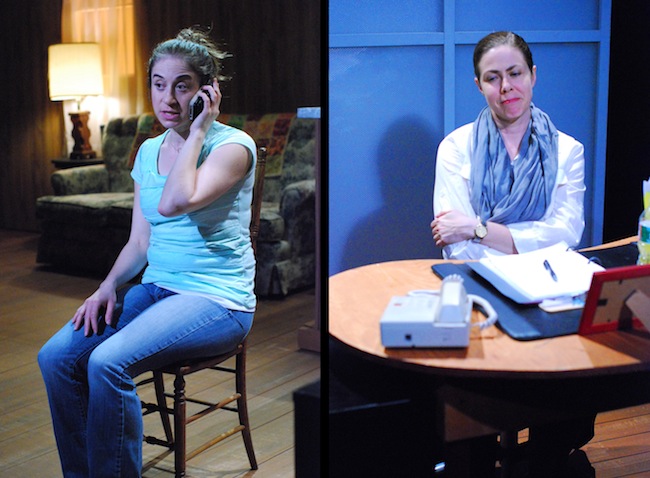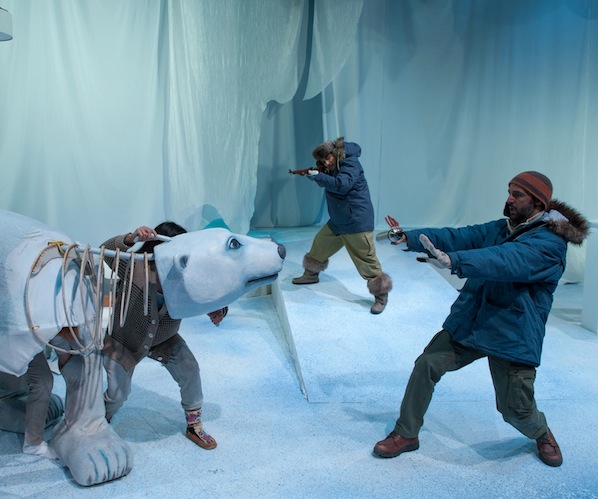Theater Review: “Good Television” and “Sila” — The Struggle to Remain Human
It is encouraging to see new plays that tackle substantial social problems.
Good Television by Rod McLachlan. Directed by David J. Miller. Staged by the Zeitgeist Stage Company at the Plaza Black Box Theater, Boston, MA, through May 17.
Sila [breath] by Chantal Bilodeau. Directed by Megan Sandberg-Zakian. A Catalyst Collaborative@ MIT Project staged by the Underground Railway Theater at the Central Square Theater, Cambridge, MA, through May 25.

(L to R): Jenny Reagan and Christine Power — at the heart of “Good Television.” Photo: Becca A. Lewis Photography
By Bill Marx
Wielding well-intentioned but heavy hands, both of these scripts look at humanity under pressure. One examines responses (admirable and venial) to global warming, while the other looks at how Reality TV fries the brains of its makers. Sila is set in the Canadian portion of the Arctic (Baffin Island, Nunavut) where polar bears struggle with rapidly melting ice and people (particularly the natives) grapple with paralyzing manifestations of corruption, greed, despair, and apathy. Good Television focuses on the machinations behind the making of a Reality TV show called Rehabilitation, which is loosely based on the real life hit program Intervention. The fictional show revolves around the trials and tribulations of a diehard addict who, after being confronted by family members, is given an opportunity to kick the habit in a high-priced clinic. The spectacle is a seamless package of emotional voyeurism and therapeutic fist-pumping.
Encouraging as it is see new plays that deal with substantial social problems (Underground Railway Theater is staging the world premiere of Sila), both are limited as drama because they stick largely to the status quo rather than take the risk of asking uncomfortable questions, aside from wondering why crass materialists always outmaneuver the liberal enlightened. In the case of Sila, supernatural forces aid the good guys in their battle against unfettered capitalism. Perhaps we should pray to the same Inuit spirits to make Reality TV go away?
Good Television is by newbie playwright Rob McLachlan, an actor with New York’s Atlantic Theater Company, and it has some of the bugs that come with any rookie flight. The supporting characters are thin, the plot diagrammatic, and the ‘leave the theater with a feeling of hope’ resolution unconvincing. Still, at least the script goes beyond indulging in easy satire of TV producer types on the hunt for killer footage. The most complex figure in the Zeitgeist Stage Company production is the well-meaning therapist-turned-producer Connie, whose fall into humility is played by Christine Power with an adroit combination of tough and tender. The catch is that you have to accept that — after working for years on a program built on the exploitation of domestic dysfunction — the smart-as-a-whip Connie believes Rehabilitation serves a useful social service. You see, she makes sure that only addicts with a chance to succeed are filmed, thus giving viewers much-needed inspiration in the face of what for many is an insoluble affliction.
This time around the prey (a rural family in South Carolina) chosen for the episode resists optimistic arrangement. The family is a mess: a twenty-something meth addict with an indifferent brother, a caring but overwhelmed sister, and an absent abusive father. But the network wants more episodes, so Connie goes down to film with her shark-in-the-making new boss behind the camera (?) and a suspicious young assistant. The result is a Jerry Springer episode in which the TV crew becomes part of the chaotic action.
McLachlan’s one-note portrait of the family under stress is patronizing and the druggie kid marginalized. The pain of the sister, Brittany, is compellingly articulated – her martyrdom is accented by flickers of affecting desperation. Thus Jenny Reagan’s scenes with Power are the emotional heart of this production. Still, the play reinforces the mentality it is supposedly critiquing. Surely one of the most pernicious things about Reality TV is that it separates the world into winners and losers. How does that success-mania shape our perceptions of the world? A drama fearlessly exploring that question would be worth seeing — here we have another example of a playwright telling us that we should admire the strength of those who deal with the losers, with no calls for resources (political, economic, cultural) outside of individual gumption and luck. Time for someone to attack the sick categories rather than accept them.
Sila is another earnest exercise, and it has the merit of accepting climate change as a fact rather than setting up a Cable TV debate between pro and con. But playwright Chantal Bilodeau has lots and lots (and lots) to say about what is stymying life in the Canadian Arctic, and she tries to fit it all in. Not only is the weather heating up, but social and cultural structures are cracking under the weight of tragic loss and the demands for radical change. During the show’s two hours she piles up tiers of issues and crises, to the point that the proceedings feel like a checklist of traumas to be covered (with mystical assistance) rather than a shapely or trenchant dramatic exploration.

Skye Ellis (inside puppet), Sophorl Ngin, Jaime Carrillo and Nael Nacer in a scene featuring man versus polar bear in “Sila.” Photo: A.R. Sinclair Photography.
The most imaginative plot line gives us an anthropomorphic mother polar bear and her cub: they are beautifully designed (kudos to David Fichter), voiced, and manipulated (Skye Ellis, Sophorl Ngin, Theresa Nguyen, and Danny Bryck) creatures, though those who flinch at memories of Bambi beware. Bring your hankies. The other narratives involve a climate scientist (an amusing Nael Nacer) who has become cynical about social action and romance, a local politician (a wooden Reneltta Arluk) too caught up in the fight for human rights to deal with domestic concerns, her feisty daughter (a dignified Sophorl Ngin), a teacher and poet whose son is deeply depressed, and a pair of Coast Guard officers, one young (a zesty Danny Bryck) and one about to retire (a smug Robert Murphy), who disagree about the wisdom of building a port on Baffin Island. There is also your standard comic guide (a pleasant Jaime Carrillo), who provides some chuckles amid the plentiful heartbreak. Each character has to deal with grief, mortality, natural and man-made disasters, and thorny conflicts between the past and the present, etc, with Inuit spirits coming in to give the bereaved, critters as well as people, the strength to carry on at the stone cold edge of the continent.
The play’s psychological and environmental dilemmas, complete with apocalyptic undercurrents, call for a Shakespearean breath and complexity, but even under the sensitive direction of Megan Sandberg-Zakian Sila (the Inuit word for breath) marches through its numerous civic/cosmic melodramas at a pace that leaves you a bit breathless, and feeling emotionally bullied to boot. The attractive shadow puppets (Gabrielle Weiler) are charming depictions of celestial specters, but when the gods show up to empower bereft humans and animals it feels more like a matter of convenience than mythic revelation, archetypes popping up on cue to assure an uplifting climax. Bilodeau is anxious not to discourage us about the enormous challenges posed by climate change, but shock is not always to be feared.
I have been re-reading James Baldwin lately for a commentary, and this sentiment, from a 1961 essay on theater, struck me: “Only by a more truthful examination of what is really happening here can we realize the true aims of theater, which are to instruct through terror and pity and delight and love. The only thing we can do now for the “tired businessman” is to scare the living daylights out of him.” As I write this the U.S. Government has just released a report in which scientists insist that “the effects of human-induced climate change are being felt in every corner of the United States … with water growing scarcer in dry regions, torrential rains increasing in wet regions, heat waves becoming more common and more severe, wildfires growing worse, and forests dying under assault from heat-loving insects.” I do not believe that theater needs to scare the bejesus out of us, but it should not be afraid of shaking us up. Just in case the gods decide to opt out from the global clean-up crew.
Bill Marx is the Editor-in-Chief of The Arts Fuse. For over three decades, he has written about arts and culture for print, broadcast, and online. He has regularly reviewed theater for National Public Radio Station WBUR and The Boston Globe. He created and edited WBUR Online Arts, a cultural webzine that in 2004 won an Online Journalism Award for Specialty Journalism. In 2007 he created The Arts Fuse, an online magazine dedicated to covering arts and culture in Boston and throughout New England.
Tagged: Chantal Bilodeau, global warming, Good Television, reality TV, Rod McLachlan, Sila, Underground Railway Theater
